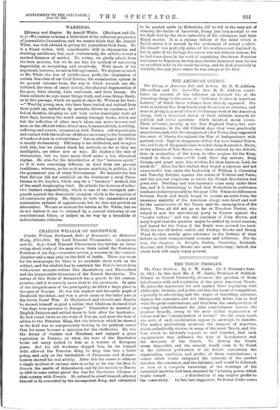WARNINGS.
Efficiency and Empire. By Arnold White. (Methuen and Co. 6s.)—We confess to being a little tired of the collected prophecies of journalistic Cassandras, and we cannot think that Mr. Arnold White was well advised in giving his journalism book form. He is a fluent writer, with considerable skill in objurgation and startling antitheses, but, read continuously, his articles reveal a marked thinness of matter. He writes, we gladly admit, from the best motives, but we do not like his method of screaming impartially at everything and everybody. With much of his argument, however, we are in full agreement. We deplore as much as Mr. White the loss of middle-class pride, the stagnation of certain branches of our Civil Service, the examination system in its present extreme form, the way in which rewards are dis- tributed, the vices of smart society, the physical degeneration of the poor, false charity, false sentiment, and false luxury. On these subjects he says many things truly, and some things finely, as in this passage, which we quote to show Mr. White at his best: —" Wealthy young men, who have been tended and valeted from their youth up, waited on by servants, driven by coachmen, and fed on dainties, sleeping on soft beds under watertight roofs all their days, learning the world mainly through books, which are but the reflection of other men's ideas, can never become real men, or the efficient rulers of real men, because solitude, hardship, suffering and sorrow, communion with Nature, self-dependence, and contact with the realities of life are necessary to the formation of leaders of men in critical times." But on other topics Mr. White is merely declamatory. Efficiency is his shibboleth, and we agree with him, but we cannot think his methods, so far as they are intelligible, are either new or wise. He deplores the rule of rhetoricians, but we have never lived under a less rhetorical regime. He cries for the introduction of the "business spirit," as if it were something different in kind from our present traditions ; whereas, so far as it means anything in politics, it is the permanent aim of every Government. He laments the fact that Britain did not establish on the Continent a rival Press- bureau to Dr. Leyds's, which may be a " business " method, but of the small shopkeeping kind. He attacks the doctrine of collec- tive Cabinet responsibility, which is one of the strongest safe- guards against the democratic atomism which is the negation of all continuous policy. He objects to both the examination and nomination systems of appointment, but he does not provide an alternative. We are as anxious for reform as Mr. White, but we do not believe it can be attained by a general tinkering at our constitutional fabric, or helped on its way by a broadside of indiscriminate criticism.




















































 Previous page
Previous page